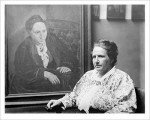Letter from Berlin: The Most Boring Subject in Europe
BERLIN—I hope I don’t doze off before I finish writing this. You see, I’m writing about the most boring topic in Europe, a theme that makes Europeans’ eyes glaze over and causes them to quickly change the subject as they sit in their quaint cafes at 4 o’clock in the afternoon, drinking coffee and eating cake. And that subject is?, you will be almost too polite to ask. The subject is Europe.
Yes, Europe is completely, totally and thoroughly uninterested in Europe. You wouldn’t think that would be the case. After all, it was just a couple of months ago, on May 1, 2004 that the 15-member European Union expanded to 25 countries to include such post-communist central and northern European nations as Poland, the Czech Republic, Hungary, Lithuania, and even the nearly imaginary island of Malta. The enlarged EU now represents 450 million people (including 380,000 Maltese). What’s more, further expansion is slated in a couple of years when Bulgaria, Romania and maybe even Turkey are let into the club. And after that, can the battling Balkans be far behind?
On top of all that, the half-century-old EU is clearly the most remarkable democratic experiment currently underway on the globe. It was “born” in a 1950 speech by French Foreign Minister Robert Schuman, who proposed integrating European coal and steel production. The post-war economic organization gradually turned into a political dream to ensure peace and prosperity on the European continent and, “Euroskeptics” aside, it seems to be working. It possesses a giant bureaucracy housed in Brussels, Belgium, a seven hundred-and-something member European Parliament located in Strasbourg, France, and a snazzy solid currency called the Euro, whose most elegant coin is the Italian 2-Euro piece featuring the head of Dante. You don’t have to be a policy wonk to be interested in a process in which old nationalisms and centuries-old bloody rivalries divest themselves of sizeable pieces of their sovereignty in the name of peaceful cosmopolitanism.
Yet, when Europe’s voters cast their ballots for the European Parliament in mid-June, three disquieting results were produced: 1) a record low voter turnout that slumped to 44 per cent (down from the 49 per cent in the last European election five years ago); 2) across-the-board punishment of reigning national governments (governing German Social Democrats and French centre-right parties got drubbed); 3) and increased success for so-called “Euroskeptic” parties. “It’s a bad day for Europe,” as Bruno Jeanbart, a Paris think-tank pundit, put it. “It calls into question the very concept of Europe-wide supra-national democracy.”
In Britain, the recently-minted U.K. Independence Party, which is calling for the Isles to pull out of the European Union altogether, rolled up 17 per cent of the votes, just behind Labour and the Tories, which both scored 22 per cent. You’d think that at least among the new EU members, who have been clamouring for years to be admitted, that there would be heightened interest. Nope, ‘fraid not. Turnout in Poland was a mere 23 per cent, in the Czech Republic it was 29 per cent and a plurality of the vote went to the party closest to Euroskepticism. “People are just fed up with everything—with politics and all the political parties,” said one Polish official. About the only place with high voter turnout was good old Malta. I guess there’s not a lot to do on Malta on a Sunday afternoon in mid-June.
The dismal display of voter apathy was followed by the predictable dark mutterings of the analysts. Why did voters stay away, and why did those who voted vote against incumbent governments? The most hopeful of the punditti saw the vote against the governments of Germany, France and Italy as a protest against “reforms” designed to weaken the welfare state and discipline workers. Grimmer commentators cited the Brussels bureaucracy and the sense of distance from the Euro Parliament that voters feel. It’s something like the aggrieved notion of “Western alienation” in Canada, except here the alienation is equi-distant from a mythical, murky centre.
A week later, the 25 European leaders, on their best behaviour, hammered out a draft European Constitution. Europeans yawned at that, too. Anyway, the constitution will have to be ratified by referendum in each country, a process that will take years and whose success is unlikely.
Maybe Europe is just going through a patch of political weariness. Certainly, Germany is. The Germans even have a long word for the phenomenon: Politikverdrossenheit, a mouthful that describes both the weariness and cross sulkiness with which the public forum is currently regarded. The country has been in an economic slump for the last five years, and though the polls report that the opposition Christian Democrats are running 20 points ahead of Chancellor Gerhard Schroeder’s governing Social Democratic-Green Party coalition, there’s not much enthusiasm for the conservatives who are likely to form the next German government, and few think they have any better solutions than the dour pols now in office.
Although, nobody talks much about it, I have the sense that Europeans are waiting. What are they waiting for? The election. The American election, that is. Everything else looks like small potatoes, local squabbles, compared to the global consequences of whether or not George Bush is re-elected. The hatred for Bush in Europe is palpable. In France, the American president has an incredible 85 per cent negative rating; it’s the same in Germany.
As Sarah Lyall, writing recently in The New York Times put it, “Across Europe, anti-Bush feeling has contributed to a consensus that the coming American election is of singular importance,” and not just for the U.S. “Anxieties about the direction America is going are accompanied by a passionate desire, cutting across national borders and party lines, to see President Bush voted out of office in November.” Even European conservatives are dubious about Bush. Says Lyall, “It is as if admiring Mr. Bush is seen as slightly shameful among thinking Europeans, like confessing a preference for screw-top wine bottles.”
So, if Europeans are uninterested in European politics, what are they interested in? That’s easy. What Europeans have been engrossed in for the last two weeks is the quadrennial European soccer championships, being played in Portugal. And what happens at the soccer championships, apart from soccer? It’s the place where you can scream your lungs out, paint your face, wear funny costumes, and get drunk as a skunk in the name of passionate, harmless nationalism.
And it is not just at the stadium in Lisbon. Millions of Europeans are glued to the tube on game nights. When Greece goes up against Portugal in the finals this weekend, you’ll be able to drive the empty German Autobahn at 200 km. an hour if you want. Everybody else will be at home or in the local sports bar.
What’s more, Euro soccer has even produced a measure of political approval, at least among my friends in Berlin. They’re tickled by the fact that all the big soccer powers—England, France, Germany, Italy and Spain—were knocked out of the tournament. The title will go to relatively small, impoverished, remote countries at the far ends of the EU, either Portugal, led by a 19-year-old heartthrob named Cristiano Ronaldo, or Greece, which, under its German coach, Otto Rahhagel, is routinely praised for its “Teutonic discipline.”
As for Germany, its soccer is in the same doldrums as its politics. When it got handily bounced from the Euro tournament by a Czech second team (just to add a little insult to ignomy), its coach, a guy named Rudi, did the right thing and resigned the next day (unlike most cabinet ministers). Now, the German tabloids are screaming for the Greek coach, “King Otto,” to come home and rescue German soccer. About the only recent German triumph on the pitch was an 8-0 win in a pre-championship exhibition game against, you guessed it, Malta. Local wits claimed that the Maltese were so short of soccer players that they fielded seven men and four goats, and that one of the Germans received a yellow foul card for having sex with one of the goats. Lame jokes perhaps, but definitely an improvement on mere torpor.
Berlin, July 3, 2004


